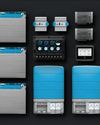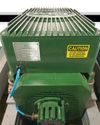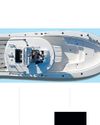
The first question we asked about Mercury's V-10 Verado outboards is why a V-10? The answer proved straightforward. By maintaining the 64-degree cylinder angle of the V-8 Verado 250/300 hp motors, Mercury can offer a 350/400 hp V-10 that maintains standard 26-inch multi-engine transom spacing. This eases rigging new boats and repowers. A V-8 with the same 5.7-liter displacement would need to be wider; for example, the 60-degree, 5.6-liter V-8 Yamaha XTO 425 requires 28.5-inch spacing.
Merc's V-10 models herald the retirement of the 19-year-old supercharged 2.6-liter Verado inline-six platform. Mercury now believes that displacement, not supercharging, proves superior for making effective outboard power. The performance we experienced aboard a variety of boats during a press preview verified that axiom. The torque curve feels fat and flat; these motors pull hard through the entire rpm range. This athletic feeling stands in contrast to that of the 2.6-liter 400 hp models, which require 400 more rpm to make peak power as torque tails off in the upper rpm range.
With a 25-inch shaft, the V-10 Verado weighs 709 pounds dry. That's 27 pounds more than the 2.6-liter Verado, but 18 pounds less than a Suzuki DF350, and 243 pounds lighter than Yamaha's 425 XTO.
This story is from the January/February 2023 edition of Boating.
Start your 7-day Magzter GOLD free trial to access thousands of curated premium stories, and 9,000+ magazines and newspapers.
Already a subscriber ? Sign In
This story is from the January/February 2023 edition of Boating.
Start your 7-day Magzter GOLD free trial to access thousands of curated premium stories, and 9,000+ magazines and newspapers.
Already a subscriber? Sign In

AFFORDABLE SATCOM
Communications devices using satellite technology are more abundant today than any time in the past. What's more, many are portable, ultra-compact, affordable relatively and designed for boating, dispelling any perceptions that you need a big, expensive dome antenna aloft to access satellite communications.

IN THE BEGINNING
REPOWERING FOUNTAIN HULL NO.1

NAVICO GROUP FATHOM 2.0
Engine charging at 48 volts could be a game-changer.

PROPS FOR INNOVATION
Sharrow MX3 propellers live up to most of the company's performance-improvement claims.

MERCURY RACING 500R
Supercharged power for a variety of boats.

FLIPPING THE SWITCH
Much reporting focuses on reasons why one might choose electric marine power. The issues of range, speed, noise levels, winterizing and ethanol challenges, lake restrictions, environmental concerns and more all must be resolved on an individual basis. Little gets said about how a boater choosing to repower with electric actually gets that accomplished. Is it DIY? And if not, how does it get done?

TOW-VEHICLE TECH
If it's been a while since you bought new tow vehicle, you might be surprised by the many built-in advancements in trailering technology. New tow tech ranges from integrated weight scales and adaptive suspensions to systems that automatically back up your truck to hitch up your trailer. Here are a few examples to look for. -Jim Hendricks

MONUMENTAL TIPS FOR BACKING A TRAILER
Three Boating greats offer advice for a perennial reader query.

STICKING POINTS - Anchoring alternatives, and why you will always need a traditional anchor.
My brother-in-law likes to fish offshore reefs, and the process once entailed navigating to a mark, dropping a float, and idling upwind or up-current to drop the anchor in hopes the set would drop us back to the float.

FOR WANT OF A CLAMP
When 100 miles from shore, home and help, this boater’s preparedness prevented potential catastrophe.